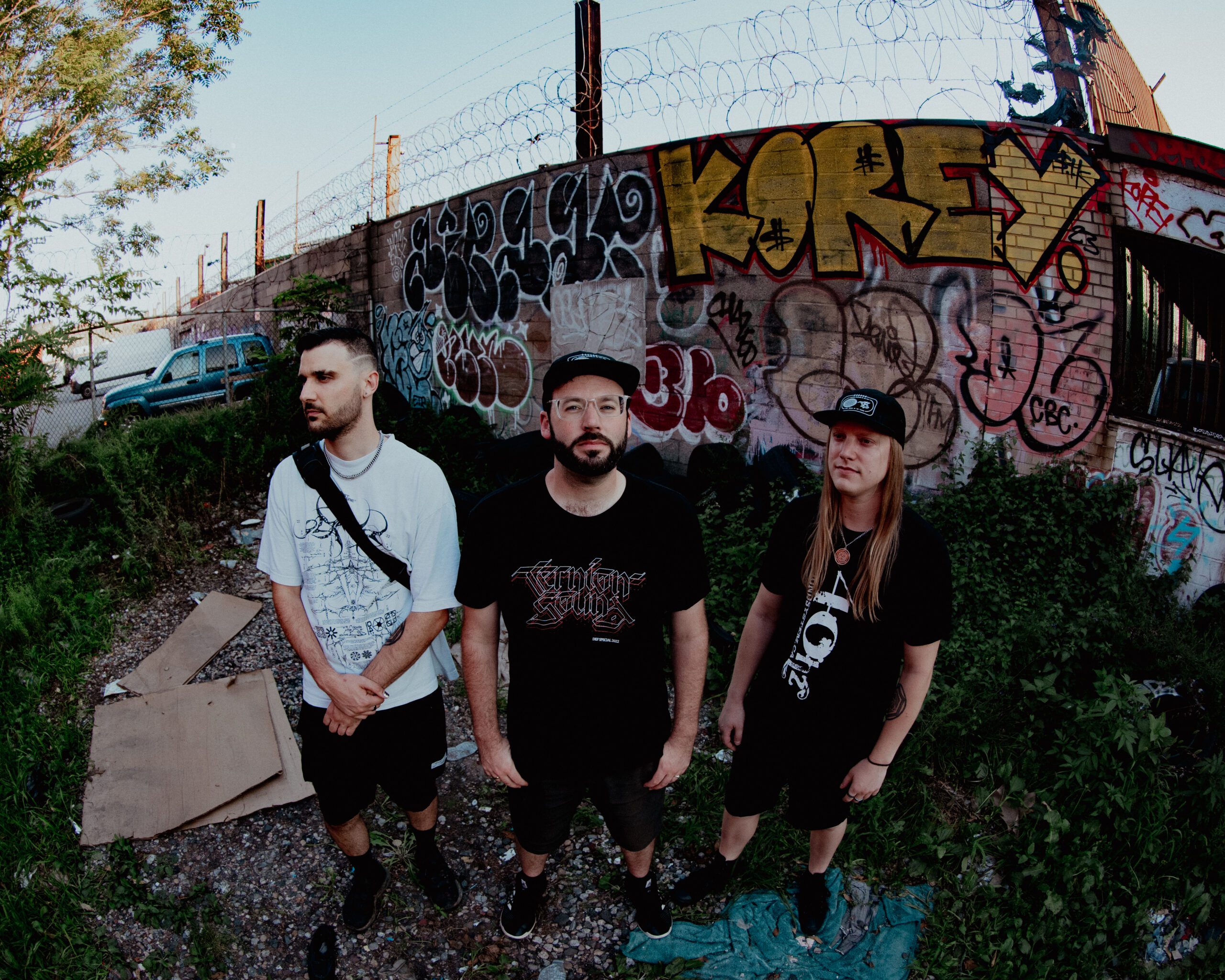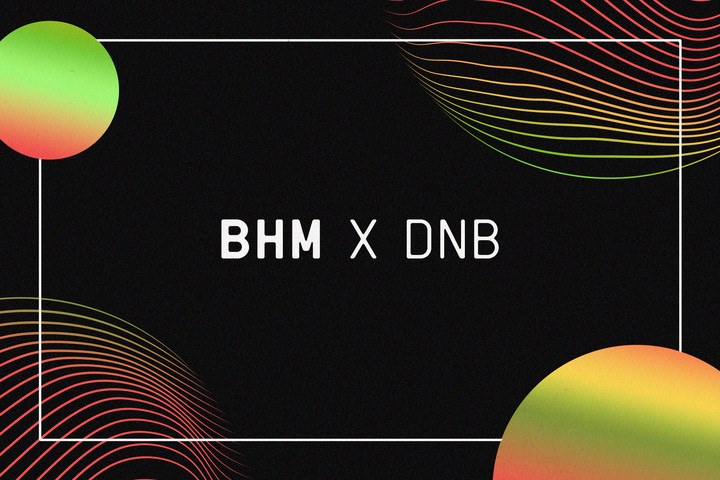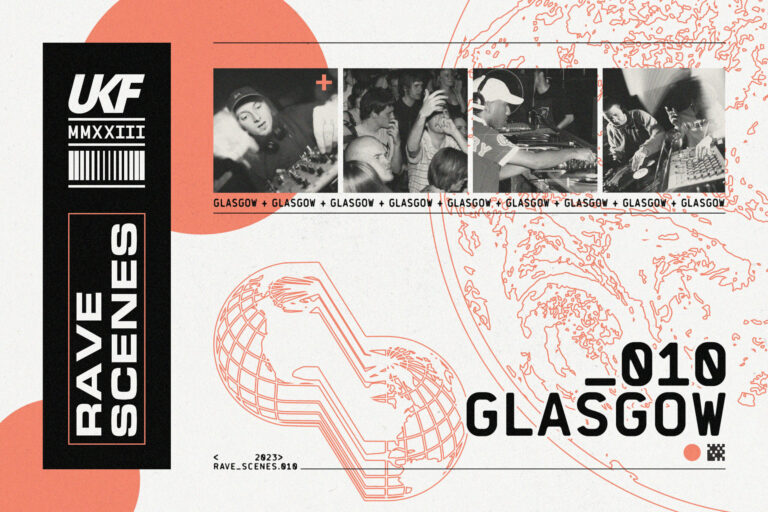PHOTO CREDIT: ERIC SILVY @evan.silvystudio
When is a debut album much more than a debut album?
When it’s Digital Artifice, the new opus from Ternion Sound.
Many moons in the making, this beguiling 20-track, multi-genre, Vision-released voyage is so much more than your typical 21st century electronic music long player. Available in both a DJ mix style of non-stop musical flow on streaming sites and available on download stores as full tracks for DJs, Digital Artifice is both a statement about how the Minneapolis trio feel about the longevity and story-telling power of electronic music and what makes them tick and operate in such a unique way.
Famed for their deep stance on the dubstep sound, often delivered with a hearty nod to the UK bass style and heritage (especially when it comes to their love of MC culture and other soundsystem styles such as drum & bass and UK garage) but always rooted in North America’s deepest traditions such as Chicago house and Detroit techno, Jack Denney, Aric Okerman, Andrew Hill have honed a unique formula and fusion that transcends territories and stale old genre boundaries and brings the best out of each member.
And after years of releases on respected imprints such as DUPLOC, Deep Dark & Dangerous, Chestplate, Deadbeats, 1985, Artikal and beyond, their fusion has reached a new zenith with Digital Artifice. A timeless homage to everything that has built up to this moment… And where they want to go next. We called them up to find out more.
Digital Artifice isn’t just a debut album is it? This is a love letter in so many ways… To albums, to the whole spectrum of genres you take influence from and DJ culture. This goes deep, right?
Jack: Yeah. I’ve been producing and listening to electronic music for about 20 years. One thing that I’ve noticed this whole time is that so many things just come and go and disappear. Entire periods or styles that I like had a huge emotional connection to that just don’t exist anymore. It freaks me out a little bit, thinking about all the music that has just come and gone.
Are there any classic genres from your past that you’d like to see make a comeback?
Aric: We are heavily influenced by Minneapolis techno. I didn’t necessarily grow up listening to rave music. I was a metal head before all this. That was my bread and butter. But right now I’m discovering so much more old school rave music than before. Tons of techno. I love that it’s so just like dancefloor palatable. A lot of our current bass music scene is obsessed with that one moment, right?
The all-important drop!
Aric: Sure. But with techno it’s the opposite of that. It’s just a flow. Come in and just dance, enjoy and look around at the people and the system. It’s not just about the one pyrotechnic moment where they shoot off all the fireworks and everything. So, that’s been really refreshing.
I love that. Let’s dive into your origin story. You all met at a music festival, Infrasound, in 2016, right?
Jack: 2016 Infrasound was the mud year. That was the year that it rained for a week before the festival, and then it rained all weekend, and it was like a logistical nightmare for a lot of reasons. Someone had missed their flight, and the guys that runs Infrasound asked if I wanted to cover for that set. I knew Aric and Andrew. We’d known each other for a while at that point. I probably met Andrew in 2009, and Aric around 2010/11.
So you didn’t just meet at the festival, then?
Andrew: No, there was a level of understanding and we already respected each other’s skills. We had a large group in Minneapolis that was pushing each other to be the best producers / DJs that they could be. So, that was already a known quantity.
Aric: I was in the scene a little bit later than both Andrew and Jack. I was in the audience when they were playing shows like, ‘What is all this music? How are they doing it?’ We all sort of grew up in Minneapolis electronic music scene and really were cutting our teeth playing shows there and regionally… But 2016 was the chance for us to actually play together. It was insane weather, but we had a lot of fun. It was foggy. At the time, we were playing some deep stuff, some brostep. It was just all over the place. It was this interesting mesh of energy, but so much fun.
Around this time there was a notable shift in US dubstep. Brostep was fading, riddim was rising. How do you perceive this transition? How did it influence you all as a unit?
Jack: This is why we started Ternion. That 2016 Infrasound set went really well so we thought maybe we should produce together. I think we knew we were going to make deeper stuff by then, too. None of us wanted to make heavy tear-out riddim stuff anymore because it was getting too inaccessible compared to the rest of the music we liked.
Andrew: We thought that with the way dubstep was going, especially with tear-out. There’s so little that you can do. Everything had to be huge and clipped. We couldn’t even throw in a melody. We wanted creative expression and freedom. I’m sure you guys remember, but [Aric and Jack] had to teach me what deeper dubstep even was. If you look up ‘Nostalgia with The Widdler‘, you can watch The Widdler teaching me how to make deep dubstep.
Aric: Another reason for us moving in the direction of deeper, more experimental music was the personalities involved in both of these scenes. With a lot of the more high-energy people we had known before, there were a lot of egocentric personalities. It was a lot about hype and energy. We just really liked people who were making music on the deep side. It just seemed they were doing it for the right reasons, and this seemed better.
I hear that. I want to tap into the influence of Detroit, a city intrinsically tied to the origins of techno, heavily influenced by industrialization and the oppressed experiences of its black and working class population. There’s a track named after the city and it’s relatively close to Minneapolis. Did you ever journey there to directly soak in the music?
Jack: I did. I went in the mid-2000s when I was a teenager and I started going out. I was going to a lot of rave-rave stuff, like goes-all-night-and-late-into-the-morning stuff in some grungy dungeon, warehouse, or whatever. I was really into gabber and breakcore particularly, and there wasn’t a ton of that here in Minneapolis so if you wanted it, you had to go to Chicago, or Detroit.
More so, I went to Chicago where there’d be this crew of hardcore and breaks guys that I always used to go out and see back in the day, but there was always those signals coming over from Detroit as well. People would come to play raves in Minneapolis, and they’d be from Detroit or Chicago and there’s always these little connections that would happen.
Go on. It’s not often you hear about communities beyond each city in North America because it’s so sprawling. Good to hear that does exist! So let’s wrap up with more on Digital Artifice. What is the oldest track?
Andrew: Maybe Particles as I recall playing that at Infrasound 2021. But the whole album is essentially a giant WIPs folder that kept getting pushed and prodded and added to over time and eventually reigned in. Then the songs just got punched up until they are ready to go in a lot of ways. Some of them are like one-shots, as we call it, where it’s like you basically write the whole track in one session, and it’s good. But a lot of them are massaged, especially because we wanted to mix the album together.
I’m really intrigued by the whole idea of shaping an album like a DJ set. Did this perspective influence which tracks you wrote or how you approached their creation?
Andrew: Just like a DJ set, sometimes you see the need for an edit, right? Or you see a gap that you’ll be like, oh, it would be really nice if I had this right here. For instance, Tangerine Dreams, when it drops it doesn’t have drums. That’s because it fit better in the context of the album that way, and then I thought it just sounded cool, anyway. I think Portland changed a bit, too, because of the way it worked in the mix.
Tangerine Dreams feels like a pivotal moment in the album’s journey. By that point, listeners have settled into the experience, and then those voices come into play. There’s so much depth to that track.
Andrew: Yeah, during the second drop, especially Sonnyjim’s part with the bass guitar, I was referencing jazz. If you listen closely, one of the last elements I added was these piano chord clusters in the background.
Oh that’s fascinating because for me that bass brought to mind another American genre: Grunge. That slack baseline and Sunny’s unique gruffness in his vocals reminded me of the darker side to the Seattle sound which I grew up with. I love this. It’s the beauty of interpretation, and regardless of whether one interprets it as a jazz or grunge, it works wonderfully. Are there any other hidden ‘easter egg’ style references in the album? And have you established a rapport with your fans so they actively search for those type of hidden references?
Andrew: We’ve got a thoughtful audience. But also, we make touchpoints when we stream so it’s essentially an AMA. Talking about longevity, or like classics that can last a long time, it’s that density and that interest and the intentionality you can put into tracks. Sometimes you can just make a fun, banger and stuff. I’ll get some of those fans [that] have been with me since my first release as Nostalgia way back in the day, and they’ll understand the language in which I have been writing all the way up until this point. And that’s super special, and that is a shared moment.
I think, as an artist, it’s way more interesting and satisfying to cultivate a smaller number of extremely awesome, interested, intellectual, knowledgeable fans that we can share experiences with, versus, let’s get as many fans as we can so that we can make more money and play shows. It’s way more interesting because we’re trying to express real stuff.
You’re absolutely right! I notice this too. Acts and artists who have smaller but more loyal fanbases will attract more readers than big mainstream acts who have followers who just follow their page passively. It’s about the depth of connection, isn’t it?
Andrew: Absolutely. There’s a playbook for large acts and there’s a playbook for American artists. There’s a playbook for fame… for social media and all that kind of stuff. I think it’s fair for me to say this: we take pride in understanding the playbook. We want to know the meta. We want to know how everything works. But at the same time, we take all that information, then take our desires and we say, ‘What is the actual path forward that is the most satisfying?’ That is how the album kind of became what it became with the mix and the DJ-able tracks on Beatport because we were thinking like, ‘I understand the Meta. I understand what Spotify wants. I understand what this wants and all this kind of stuff, but what is going to be the most interesting thing we can do?’
I love that. Very pragmatic but not compromising your creativity. So where are you all at now? Often, after releasing a massive album like this, artists generally fall into two camps… Some need a break from the studio, wanting to focus on personal life, maybe tour, or just rest. Others dive right back in, driven by fresh ideas. Where do you see yourselves post-Digital Artifice?
Jack: I’m on both sides of that. On the one hand, I feel like that was a lot and we just did a lot of touring, too. I always kinda want to take a break. But, on the other hand, there’s so much shit that I want to do still, and like so many different experiments and things that I want to make happen. So, the train never stops, the journey never ends, you know?
Aric: I think I’m mostly in category two here. I’m excited to kind of just keep going and see what’s next. It does feel really good to kind of put this album behind us. But now that it has come out, we can sit and see what happens as a result of it, and that’s all been really fun is to see. Like, what kind of reach is this going to have, and who’s going to like it and why?
But as far as the writing is concerned, I think we’re all definitely like work-obsessed with the project and having to continue momentum. We’ve always prided ourselves on being forward-thinking. We have to have goals that we’re going to continue to move towards. Otherwise, it feels like we’re stagnant.
But this feels great. I want to take time to look at this album and be proud, and really think about how exciting this is for us, especially working with Vision, which is totally bucket list for all of us, and take that moment for ourselves. But also, I am also excited to have no sort of writing obligations. We can do whatever we want to do right now, and that feels exciting.
Andrew: Yeah, I think there was a lot of pressure, and that was really tough. But at the same time, I developed my own routine when working on the final parts of the album that I really fell in love with. Like I could see myself doing this again!
Follow: Ternion Sound: Soundcloud/Instagram/Bandcamp


